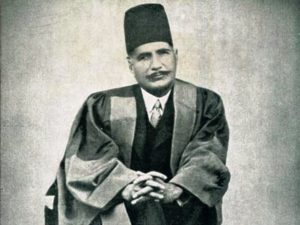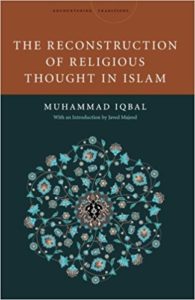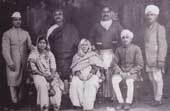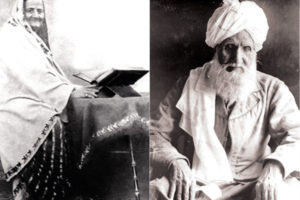
In the late 1920s the Indian Islamist and poet Mohammed Iqbal delivered six lectures at Madras (to the Madras Muslim Association), Hyderabad and Aligarh, in which he set out his vision of the reconstruction of religious thought in Islam. Apparently Iqbal himself intended to write a second, larger book to be called “The Reconstruction of Legal Thought in Islam”, to which these lectures formed a sort of philosophical prelude. That second book was never written, but the lectures were combined with a seventh lecture (“is religion possible”) that was delivered to the Aristotelian society in England, and published as a book “The Reconstruction of Religious Thought in Islam”. By the time the book was published (first in Lahore in 1930, by Kapur Art Press, then with the seventh lecture included, by Oxford in 1934), Iqbal had been knighted for his services to the crown and was already a famous poet (in both Urdu and Persian) and was being honored by the Islamicate elite of India as their philosopher and thinker par excellence. Since this is the only work of philosophy that he ever composed after his PhD thesis, his status as a philosopher is heavily dependent on this slim volume.

The book is primarily targeted at contemporary Muslims, who were keenly aware of their weakness vis-a-vis Europe, as well as of their historic role as a “worthy opponent” that at some point in the past held the upper hand against Western Christian competitors. Iqbal’s primary mission here is not some open ended search for philosophical truth, it is the revival of Muslim greatness, the basic fact of which is taken for granted and is an element of faith. In his own words:
“I have tried to meet, even though partially, this urgent demand by attempting to reconstruct Muslim religious philosophy with due regard to the philosophical traditions of Islam and the more recent developments in the various domains of human knowledge.”
Like many other religiously minded thinkers of the day, he was also quite taken with modern physics and believed “the present moment is quite favorable for such an undertaking. Classical Physics has learned to criticize its own foundations. As a result of this criticism the kind of materialism, which it originally necessitated, is rapidly disappearing; and the day is not far off when Religion and Science may discover hitherto unsuspected mutual harmonies.”
In terms of his education and training, Iqbal was firmly in the Western philosophical tradition (tending mostly towards its German, orientalist, idealist and romantic currents) and like other Islamist modernizers, he took it for granted that the “Muslim world” has to come to terms with modern knowledge, but this was to be done from within the Islamic tradition and while maintaining the distinctive character of Muslim society. His grandfather may have been a Kashmiri Hindu (his son claims the conversion happened 400 years earlier) and it has been claimed that there were branches of the family that remained Hindu, but either because of this relatively recent conversion, or because of his mother’s strong Muslim faith, his commitment to Muslim separatism and supremacism was strong and unbending. He was willing to admire other traditions (including the learning of the Brahmins, about whom he has interesting things to say elsewhere) and learn from them, but they are always “other” traditions, about this there is never any doubt.


The books is interesting, especially if you are philosophically inclined towards the “spiritual” and the mystical; on the other hand, if you are somewhere on the “new atheist” spectrum then the book can only be of historical interest. Even those who are willing to entertain metaphysical speculation should be aware that this is not a systematic philosophical text. All the central claims of the book are simply asserted (there is rarely any detailed argument showing why they are correct) and the historical views are very early 20th century, with the ghosts of Spengler and countless lesser writers hovering in the background. Entire cultures and historical epochs are summed up in ex-cathedra pronouncements of the sort that were popular in that age but seem to have fallen out of favor since then. For example “the cultures of Asia, and in fact, of the whole ancient world failed because they approached reality exclusively from within and moved from within outwards. This procedure gave them theory without power, and on mere theory no durable civilization can be based”.
Always hovering in the background is his (not so original) view that history is progressive and something is gradually unfolding and developing as we move from ancient cultures (India, Greece, never China) to Islam to modern Europe. In this great drama, the “spirit of Islam” is essentially anti-classical and empiricist and it is Islam that created the foundations of modern science by introducing this attitude into humanity (“European culture, on its intellectual side, is only a further development of some of the most important phases of the culture of Islam”). This basically Hegelian view of history was all the rage in the circles that Allama Iqbal frequented (its echoes survive to this day), and if this is still your cup of tea, jump right in, Iqbal will not disappoint you. Continue reading Review: The Reconstruction of Religious Thought in Islam